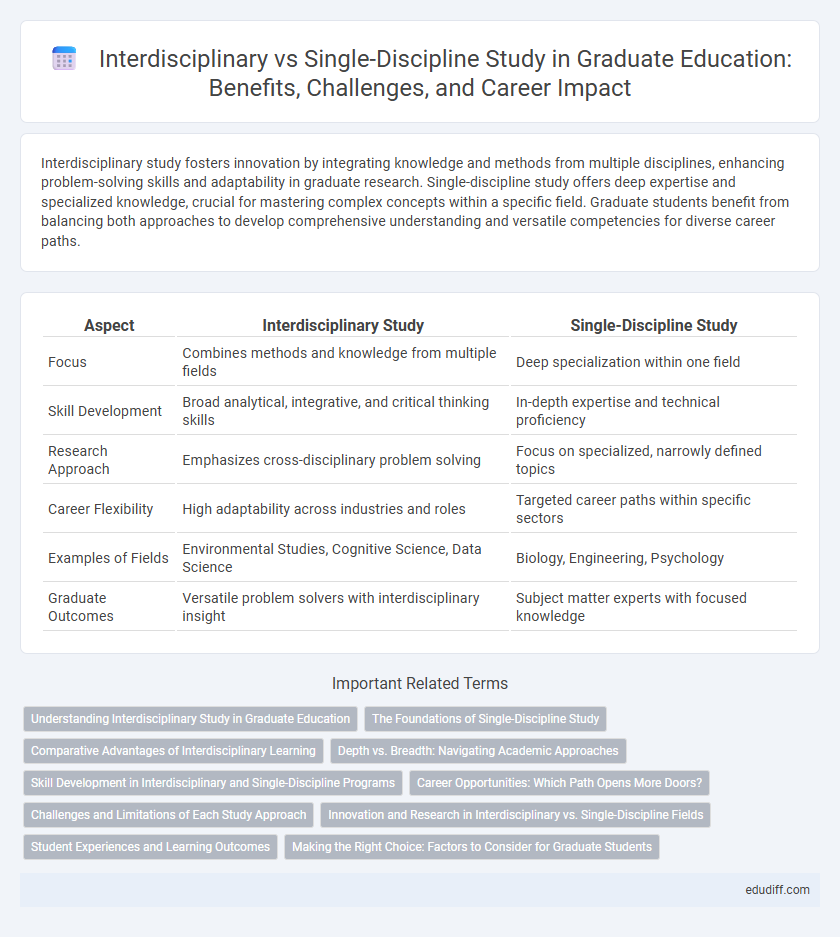Interdisciplinary study fosters innovation by integrating knowledge and methods from multiple disciplines, enhancing problem-solving skills and adaptability in graduate research. Single-discipline study offers deep expertise and specialized knowledge, crucial for mastering complex concepts within a specific field. Graduate students benefit from balancing both approaches to develop comprehensive understanding and versatile competencies for diverse career paths.
Table of Comparison
| Aspect | Interdisciplinary Study | Single-Discipline Study |
|---|---|---|
| Focus | Combines methods and knowledge from multiple fields | Deep specialization within one field |
| Skill Development | Broad analytical, integrative, and critical thinking skills | In-depth expertise and technical proficiency |
| Research Approach | Emphasizes cross-disciplinary problem solving | Focus on specialized, narrowly defined topics |
| Career Flexibility | High adaptability across industries and roles | Targeted career paths within specific sectors |
| Examples of Fields | Environmental Studies, Cognitive Science, Data Science | Biology, Engineering, Psychology |
| Graduate Outcomes | Versatile problem solvers with interdisciplinary insight | Subject matter experts with focused knowledge |
Understanding Interdisciplinary Study in Graduate Education
Interdisciplinary study in graduate education integrates diverse academic fields to foster innovative problem-solving and a holistic understanding of complex issues. This approach enhances cognitive flexibility by encouraging students to synthesize methodologies, theories, and perspectives from multiple disciplines. Graduate programs emphasizing interdisciplinary education develop critical thinking skills and adaptability essential for addressing multifaceted challenges in research and professional environments.
The Foundations of Single-Discipline Study
The foundations of single-discipline study emphasize deep expertise and focused knowledge within a specific academic field, fostering mastery and specialization critical for advanced research and professional practice. This approach enables students to build a robust theoretical framework and methodological skills tailored to their discipline's unique paradigms. Concentrating on a single discipline often leads to highly specialized careers and contributions to the development of domain-specific innovations and solutions.
Comparative Advantages of Interdisciplinary Learning
Interdisciplinary learning integrates diverse academic fields to foster innovative problem-solving and critical thinking skills beyond traditional boundaries. It cultivates adaptability and collaboration, preparing graduates to tackle complex, real-world challenges with comprehensive perspectives. Students engaging in interdisciplinary studies often demonstrate enhanced creativity and the ability to synthesize information across various disciplines, leading to more holistic and effective solutions.
Depth vs. Breadth: Navigating Academic Approaches
Interdisciplinary study promotes breadth by integrating methods and knowledge across multiple fields, fostering innovative problem-solving and adaptability essential for graduate research. Single-discipline study emphasizes depth, offering specialized expertise and rigorous analysis crucial for mastery and academic contribution within a particular domain. Balancing breadth and depth enables graduate students to navigate complex academic challenges and enhance their research impact.
Skill Development in Interdisciplinary and Single-Discipline Programs
Interdisciplinary study cultivates versatile skill sets by integrating knowledge from multiple fields, enhancing critical thinking, problem-solving, and adaptability crucial for complex, real-world challenges. Single-discipline study fosters deep expertise and technical proficiency within a specialized domain, promoting mastery and precision in specific skill areas. Graduates from interdisciplinary programs often demonstrate superior collaborative and innovative abilities, while single-discipline graduates excel in focused analytical and technical roles.
Career Opportunities: Which Path Opens More Doors?
Interdisciplinary study cultivates diverse skill sets and adaptability, making graduates attractive to employers seeking innovative problem-solvers in fields like technology, healthcare, and environmental science. Single-discipline study provides deep expertise and specialization, essential for careers demanding advanced knowledge such as law, medicine, and academia. Career opportunities expand significantly when graduates align their educational paths with industry demands and emerging market trends.
Challenges and Limitations of Each Study Approach
Interdisciplinary study often encounters challenges such as integrating diverse methodologies and balancing competing theoretical frameworks, which can hinder depth of expertise in any single field. Single-discipline study, while providing focused specialization, faces limitations in addressing complex real-world problems that require multifaceted perspectives and cross-domain knowledge. Graduate students in interdisciplinary programs may struggle with less defined curricula and collaborative demands, whereas those in single-discipline tracks may experience reduced flexibility and innovation potential.
Innovation and Research in Interdisciplinary vs. Single-Discipline Fields
Interdisciplinary study fosters innovation by integrating diverse perspectives and methodologies, leading to novel research breakthroughs that single-discipline approaches may overlook. Research in interdisciplinary fields often results in comprehensive solutions to complex problems by combining knowledge from multiple domains, enhancing creativity and adaptability. Single-discipline study provides deep expertise and methodological rigor, but may limit the scope of innovation due to its narrower focus.
Student Experiences and Learning Outcomes
Interdisciplinary study fosters critical thinking and innovation by integrating knowledge across multiple fields, enhancing student adaptability and problem-solving skills. Single-discipline study provides deep expertise and mastery in a specific area, supporting focused career paths and advanced research capabilities. Students in interdisciplinary programs report higher engagement and collaborative learning experiences, while single-discipline students often excel in specialized technical competencies and academic depth.
Making the Right Choice: Factors to Consider for Graduate Students
Graduate students should evaluate their career goals, learning style, and industry demands when choosing between interdisciplinary and single-discipline study. Interdisciplinary programs foster holistic problem-solving skills and innovation by integrating knowledge across fields, while single-discipline programs provide deep expertise and specialized credentials. Considering factors such as program flexibility, research opportunities, and potential employer preferences ensures alignment with long-term professional objectives.
Interdisciplinary Study vs Single-Discipline Study Infographic

 edudiff.com
edudiff.com